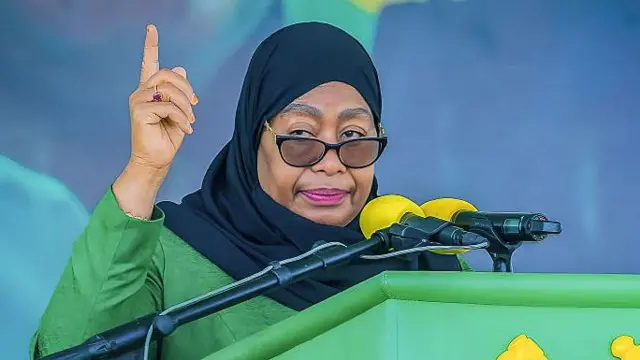President Samia Suluhu Hassan took the oath of office on Monday. The ceremony was strictly limited to invited guests only.
This inauguration followed a fiercely contested election that quickly triggered deadly protests nationwide. Controversy surrounded the poll after two major opposition figures were barred from running.
The swearing-in occurred on government grounds in the capital, Dodoma. This represents a clear break from tradition. Past presidential inaugurations typically took place in crowded, public football stadiums.
Escalating Tensions and Widespread Disruptions
Tensions remain high in the commercial hub of Dar es Salaam. This follows three straight days of protests after the October 29 vote. Many essential businesses, including grocery shops and gasoline stations, have remained shut. Streets are largely empty as numerous government employees work remotely. Similarly, most residents in Dodoma are also mostly staying indoors.
The election itself was marred by violence. Protesters took to the streets in major cities to demonstrate against the initial results. They attempted to obstruct the counting process. Consequently, the military was deployed to support police efforts to suppress the riots.
Furthermore, internet access has been unstable throughout the East African nation, severely hindering travel and commerce. The widespread disturbances forced the government to delay the reopening of universities, originally scheduled for November 3.
Opposition Rejects Outcome Amid Casualty Reports
Official Tanzanian sources have not disclosed figures for the number of people injured or killed during the unrest. However, outside reports indicate significant loss of life. Reliable sources suggest ten people died across the towns of Dar es Salaam, Shinyanga, and Morogoro.
The main opposition group, Chadema, formally rejected the election outcome. They stated the results had “no basis in reality,” insisting that a “genuine election did not take place in Tanzania.”
The political turmoil intensified after opposition leader Tundu Lissu was incarcerated for several months. He faces charges of treason for demanding electoral reforms he argued were necessary for a fair poll. Another key opposition member, Luhaga Mpina from the ACT-Wazalendo Party, was also disqualified from the race.
Regional Diplomacy and Economic Fallout
The presidents of Somalia, Burundi, Zambia, and Mozambique were in attendance at the restricted swearing-in ceremony on Monday.
Meanwhile, the President of Kenya issued a public statement. He urged Tanzanians to maintain peace and called for political dialogue among all stakeholders to secure national stability. The Kenyan leader sent his vice president to represent him at the inauguration.
The post-election violence has also caused regional economic fallout. The Namanga border crossing with Kenya was shut down. Trucks carrying vital agricultural goods have been stranded for six days, resulting in spoiled cargo.
READ ALSO: Presidency Asserts Tinubu Anticipated US Security Stance






